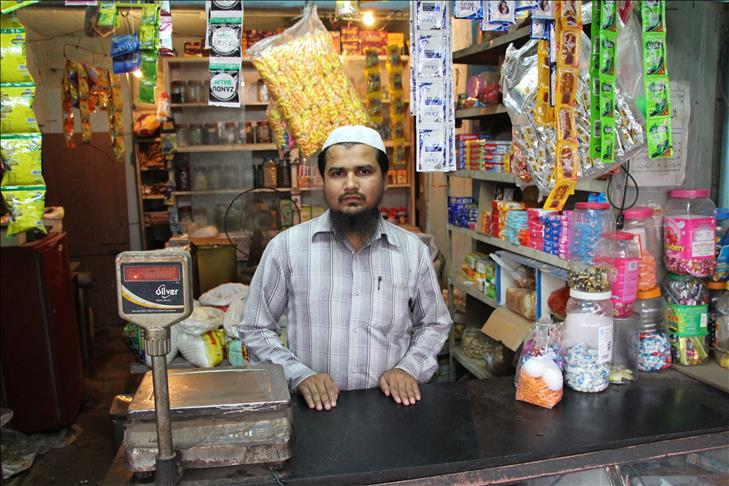
NEW DELHI
Last week 34 Bengali-speaking Muslims were killed in India's northeastern state Assam. The attack was followed by a social media backlash, supported by right-wing politicians, against so-called illegal migration to the tea-growing state from neighboring Bangladesh.
The anti-Muslim attack by Bodo rebels stemmed largely from the perceived rapid growth of the Muslim population, which they blame on "infiltration" through the porous border with Bangladesh. Days before the Assam violence, Hindu nationalist Bharatiya Janata Party’s prime ministerial candidate Narendra Modi had raised the issue at a rally in eastern state West Bengal. “You can write it down. After May 16, these Bangladeshis better be prepared with their bags packed,” said Modi.
Critics including Omar Abdullah, Indian-held Jammu & Kashmir's chief minister, have indirectly blamed Modi for the attacks but M.J. Akbar, a prominent Muslim journalist who recently joined BJP as party spokesperson, said blaming Modi is a knee-jerk reaction.
The BJP figurehead however, raised the issue once again on Sunday, saying “those who observe Durgashtami (a Hindu festival), they are part of our Hindustan and they will stay here. But we will deport those who are infiltrators.” According to Anil Bhatia, a journalist and political commentator, the remarks were meant for Modi's core base of right-wing Hindutva – a politicized Hindu ideology – supporters.
The attack was followed by an unsympathetic backlash against Bangladeshis on micro-blogging site Twitter. For two days the hashtag #DeportBangladeshis was taken up with vigor and became one of the most discussed topics.
“Much of the political discourse around ‘illegal migration’ is simply hyperbole and bereft of facts,” said Bhatia. He said the social media backlash was created by a certain, privileged section detached from most of Indian society, which is not represented on social media.
“Their share in the country’s population is less than 20%, but their share in the noise in the country is over 80%,” Bhatia claimed.
Sukla Sen, a Mumbai-based Bengali activist, shares the same sentiment. “Those who’re tweeting on this issue, I’d guess, have little or no connection with the problem itself,” said 64-year-old Sen. “They’re self-appointed foot soldiers of the Saffron Brigade spewing venom finding a grand opportunity.”
Siddharth Varadarajan, a senior Fellow at the Centre for Public Affairs and Critical Theory, argued in Indian daily newspaper Economic Times that Modi has made a point of distinguishing between Hindu migrants, who he welcomes, and Muslims, who he calls to be deported.
Bhatia challenges the idea that Bangladesh is a country of poverty-stricken millions searching for a better life in India. “Economic facts could perhaps convince our chatterati where moral reasoning fails,” he said.
Bhatia says Bangladesh's economy has been transformed by the garment, gas and micro-finance industries, helping it to an unemployment rate of 4.8 percent - less than half of India's.
“Bangladesh has a per capita income of US$770, West Bengal US$750 and Assam posts US$600,” he said, arguing mass migration to Assam is a myth. “Perhaps some migration does take place, but how large could the numbers realistically be?”
On Tuesday, Bangladesh's commerce minister Tofail Ahmed claimed there are "no illegal immigrants from Bangladesh in India" and warned Modi's comments could damage relations between Bangladesh and India.
Bhatia highlighted a misconception that Assam and Bangladesh share a large border. “Assam is a mere 263 km—6 per cent—of the length [of the border], with more than half being shared with West Bengal,” he said, pointing out that there had been no riots in other states on the Indo-Bangla border.
Bhatia criticized the “double-standard” of Indians who are upset with Bangladeshi “infiltration” but undisturbed by Nepali migration.
“Regardless of the record of Nepalis in abiding by the law, or the links of their Maoists with India’s own, Indian politicians are happy to offer an open border to the Hindu-majority neighbor to the north," he said. "Is it because Nepalis are seen as co-religionists?”
Sen points out that there were both Muslim and Hindu migrants before Bangladesh's independence in 1971 but that many Muslims returned afterwards. He also highlights the roots of “anti-foreigner” agitation in 1979.
“It was targeted against all non-Assamese, but specifically against Bengali-speaking people - both Muslims and Hindus, and Nepalis,” he said. “Assamese speaking Muslims were not touched. In fact, a few of them found place among the agitation leaders of All Assam Students Union, Asom Gana Parishad (Assam Peoples Association) and United Liberation Front of Assam."
Sen claimed the right-wing Hindu groups find a “convenient peg” in Bangladeshi “infiltration” issue to indulge in Muslim-bashing. He suggests South Asian countries should adopt a visa-free travel policy to mitigate disputes over migration but Bhatia says there is no need for any new policy. "I would look for a solution to the problem if it existed. The facts are that there are next to zero inward migrations happening,” he said.
Sen said “illegal immigrants” meaningfully contribute to India's economy by taking part in legitimate economic activities. “They don’t come to India to beg on the streets or live on some state doles.”
englishnews@aa.com.tr


